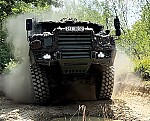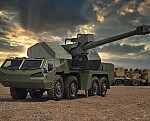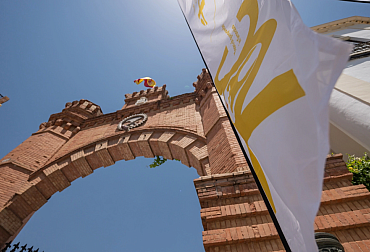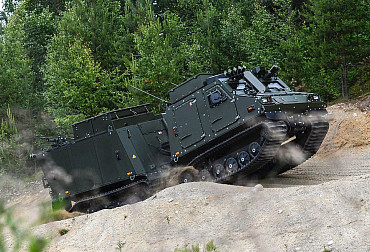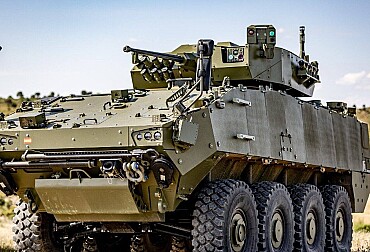Only the stressful environment will show the qualities of each individual, says Colonel Vybíhal, Commander of the Multinational Battle Group Slovakia
The Czech Army is in command of the Multinational Battle Group Slovakia (MN BG SVK), which was established in spring 2022 as part of the effort to strengthen NATO's eastern flank in response to Russia's aggression against Ukraine. This is the 3rd rotation, which is coming to an end. The current commander of MN BG SVK is Colonel Miroslav Vybíhal, whom we asked for a balance sheet interview.

The 3rd rotation of the Multinational Battle Group Slovakia (MN BG SVK) is over. Do the individual rotations differ in any way?
I would start in reverse, in terms of what all rotations since 2022 have had in common. That was to strengthen the eastern wing of the North Atlantic Alliance in the context of the ongoing war conflict between Ukraine and the Russian Federation. In terms of how the different rotations differed, it was in the composition, equipment and weaponry of each unit. As an example, the Army of the Czech Republic initially deployed Pandur wheeled armoured vehicles and then BVP-2 tracked armoured vehicles. A similar situation was the case with the German unit, which during our rotation had Boxer armoured wheeled vehicles, then Leopard 2A6 tanks and now, as part of the rotation of this unit, the armament has been changed to the Puma infantry fighting vehicle. This is the first ever deployment of this system in a foreign operation. Last but not least, I would like to point out that each successive rotation has the advantage of building on the work of its predecessors. In other words, you're not starting from scratch. The problems that the previous rotations had faced had already been resolved and we were able to concentrate on the full execution of the tasks and the improvement of individual processes.

Did you have the opportunity to select people for your staff and was it beneficial for you?
Like my predecessors in the past, when building contingents for overseas operations, I was partly able to choose the soldiers for my staff. The advantage really is that you can choose a team of subordinates that you can rely on both professionally and humanly. In that sense, I chose the people on my staff. I would add, however, that in a real war no commander has that option because he would be deployed within his organic unit as it is built on wartime numbers and with the knowledge that not all people achieve all the required moral and professional capabilities. That does not mean, however, that I have taken the imaginary best human resources. In assembling the team, I tried to select trained and mature members of the 7th MB staff, as well as from other units and facilities of the Army, and I equally selected soldiers who had not yet had the opportunity to participate in a foreign operation. I wanted to achieve such proportionality that the experienced ones would pass their knowledge to the less experienced ones. I would also like to add that for some of the specialties I was assigned soldiers and had no chance to influence their selection.

So you had a great team?
There is no such thing as complete perfection of subordinates, but I think I made the right choices in my selection, even though I didn't know exactly how many of them would perform under the pressure of events and the complexity of the task at hand. For it is only the stressful environment that will bring out the qualities of each individual, not only on the staff, but within the contingent as a whole. Working with people is the most complex managerial skill, and the performance of the entire unit depends on how leaders in each function can bring the collective together, motivate positively, and maximize the individual's abilities for the benefit of the whole. At the end of our tenure, I must clearly assess that I have been very fortunate in the people I have selected and assigned, not only within the national section, but also internationally.
How do you evaluate the cooperation with foreign commanders from Germany, Slovenia, USA and Slovakia? Were they experts in their places?
The bulk of my military career has been interwoven with working with alliance and coalition partners, not only in foreign operations, but also during my time in NATO structures in Mons, Belgium. I cannot find adequate words to express it here, simply the professional, collegial and in some cases very friendly attitude of all alliance partners. One of our common goals was to deepen NATO's cohesion and effectiveness. We always performed any task under one flag, namely the NATO flag and the flags of the participating nations. We always performed as one team, and that is simply not possible without quality personnel. I think that all the countries have sent experts in their own right, and I have not seen a hint of doubt or a dismissive attitude from our alliance partners during the whole time I have been there.

What specifically did the command and control of the MN BG SVK to Czech Army bring?
Command and control of a multinational battle group is a significant benefit for the Czech Armed Forces in terms of experience and ability to plan, organise, manage and control units in the framework of alliance operations. For our Army, which is smaller in size than the larger NATO nations, this is a daunting task. The whole process does not start in the deployment area, but long before, and involves a whole range of processes and tasks at different levels of command and control. One of the great experiences is the planning and implementation of the Combat Readiness Evaluation (CREVAL) methodology. This assessment is the responsibility of the nation's leader and includes a review of all major capabilities of the battle group. A team of experts from all contributing nations must have the appropriate NATO International Course for CREVAL and will vet our unit down to the last detail. I believe that the tasks associated with such an assessment are a significant benefit to the future of our military. We would not have been able to gain experience of this magnitude without the position of leading the nation. Of course, there is more experience. One of them is joint operations with units of participating nations, joint daily training associated with the exchange of experience, tactical procedures, etc. These experiences
Of course, these experiences are reflected and reflected in the training of our units on the territory of the Czech Republic. Last but not least, it is prestige for the Czech Armed Forces and the whole Czech Republic among our partners.

Did the way of commanding each rotation differ depending on which units were operating in MN BG SVK?
I dare say that the command did not differ substantially. The structure and capabilities of the individual contingents changed continuously, but from the point of view of command and control it did not have any significant effect.
How do you assess the overall alignment of the soldiers of all the participating countries in the 3rd rotation? What do you think needs more work?
This question can be viewed from two levels - national and international. On the first national side, I would like to point out that the Czech Armed Forces pays considerable attention to the systematic preparation and inspection of troops before their deployment to any foreign operation. Our contribution to the international battle group here in Slovakia was no exception.
In the international part, the system of preparation and the actual quality of deployed units is varied, but not qualitatively inferior. In other words, we have encountered varying levels, and in the beginning I had to devote considerable effort to unify and fine-tune some of the capabilities so that we could succeed in the certification exercise. From my perspective, some of the processes need to be set up with coalition partners prior to the actual deployment. On the other hand, it is true that the workload of army units, regardless of nationality, is considerable and the time allocation for quality preparation is therefore logically insufficient. Ultimately, the process of integration and joint training is set up in such a way that the battle group is able to be deployed and accomplish the set tasks.

The Spaniards will command the next rotations. Will you be handing over the command of MN BG SVK to them with any specific recommendation or advice?
The Czech Army will still be in command of the next 4th CU of the Czech Armed Forces, which will take over from us in January 2024, and the Spaniards will take over the command of the Multinational Battle Group Slovakia in the summer of next year. However, they will already be here in practice from January, gradually familiarising themselves with the local environment and the tasks they will have to perform. Every commander always familiarises himself in advance with the tasks ahead of him, and this is true in all armies of the world. The Spaniards are already taking an enormous interest in our knowledge and experience. The whole handover process is formalised in NATO doctrines and a detailed transformation plan is already being drawn up. Last but not least, it should be noted that the ACR will not end its participation by handing over the responsibility of the leading nation and will leave both units and part of the command on the territory of Slovakia.
Would you change anything in the future on the current MN BG SVK model in order to make this grouping even more efficient?
At the moment it is probably premature to assess the effectiveness of the current structure. However, from my point of view, I assess that the current structure meets the parameters to fulfil the given tasks. Of course, there is always room for improvement and there are many problems, especially in the area of logistics and interoperability. Last but not least, it must be remembered that the system and processes are constantly evolving and time and effort is the only remedy to improve and eliminate the current shortcomings.
How would you evaluate the entire 3rd rotation of the MN BG SVK within Czech Army?
I personally evaluate our task force as a significant achievement of hard work at all levels. We managed to plan and execute a series of exercises that we would not have been able to conduct on the territory of the Czech Republic due to capacity and time constraints. All of these exercises have pushed the capabilities of the battle group into its current form, that is, into a form where the battle group is capable of deploying and accomplishing tasks not only of deterrence but also of real combat deployment. I am fully convinced that all the achievements, experience and acquired knowledge will be fully used in the future both in the territory of the Czech Republic and wherever our assistance is needed.





